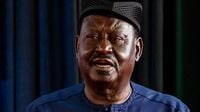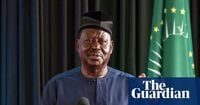Kenya was plunged into mourning on Wednesday, October 15, 2025, with the sudden death of Raila Odinga, the former prime minister, opposition stalwart, and a towering figure in the nation’s political landscape. Odinga, who was 80, died of a heart attack while traveling in India, marking the end of an era for Kenyan democracy and the wider African struggle for multiparty governance.
According to Devamatha Hospital in Kerala State, Odinga collapsed during a morning walk and did not respond to resuscitation efforts. His passing was confirmed by the hospital, sending shockwaves through Kenya and beyond. As CNN’s Larry Madowo reported from Nairobi, the country quickly entered a period of collective grief, with national leaders and ordinary citizens alike gathering at Odinga’s home in the capital to pay their respects.
President William Ruto, reflecting the gravity of the loss, declared a seven-day period of national mourning. During this time, Kenyan flags will fly at half-staff in honor of Odinga’s legacy. Ruto announced that Odinga would be accorded a state funeral, underscoring his outsized influence on the nation's political life. In a statement, Ruto described Odinga’s death as an “immense and immeasurable loss.”
Odinga’s political journey was nothing short of remarkable. A member of the Luo ethnic group from western Nyanza province, he was born on January 7, 1945, in Kisumu—a city nestled on the shores of Lake Victoria. His father, Jaramogi Oginga Odinga, was Kenya’s first vice president, and the younger Odinga followed in his footsteps, albeit carving his own path as a relentless advocate for democracy and social justice.
Odinga’s early years were marked by academic pursuit and activism. After attending local schools, he traveled to East Germany to study engineering. Returning to Kenya in the 1970s, he taught at the University of Nairobi and launched several business ventures, including a successful enterprise selling liquid petroleum gas cylinders. But it was his political activism—often at great personal risk—that truly defined him. In the 1980s, Odinga emerged as a fierce opponent of President Daniel arap Moi’s one-party rule. He was linked to a failed coup attempt in 1982, and though never convicted, he spent much of the next decade in detention, enduring what he later described as harsh treatment and torture. “If a regime is undemocratic, if a regime does not enjoy legitimacy, the people are justified to resist that regime,” Odinga once told The Associated Press, defending the right to civil disobedience.
After a brief exile in Europe in 1991, Odinga returned to Kenya in 1992 and won a seat in the national assembly, quickly becoming a voice for those disaffected by corruption and poverty. His influence only grew as he accepted a ministerial position in 2001 and played a pivotal role in the rise of Mwai Kibaki, whom he supported in the 2002 presidential race. Yet, Odinga’s ultimate ambition—to become Kenya’s president—remained elusive despite five determined bids over three decades.
His closest brush with the presidency came in 2007, when he faced off against incumbent Mwai Kibaki in what became one of the most contested elections in Kenyan history. Official results gave Kibaki 46% of the vote to Odinga’s 44%. Odinga’s camp rejected the outcome, fueled by widespread doubts about the electoral process. The aftermath was devastating: protests erupted in Nairobi and violence quickly spread, with hundreds killed in ethnic clashes that shattered Kenya’s reputation as a beacon of stability in East Africa. The electoral commission’s leader later admitted uncertainty about who had actually won. While Odinga himself was never accused of inciting violence, other prominent figures—including future presidents William Ruto and Uhuru Kenyatta—faced criminal charges at the International Criminal Court. Ultimately, no successful prosecutions emerged, with cases collapsing amid allegations of witness intimidation and political interference.
In the wake of the turmoil, Odinga was appointed prime minister in a unity government brokered by the international community. This role cemented his status as a statesman and a bridge-builder, even as he remained a fierce critic of corruption and authoritarianism. His activism was central to Kenya’s transition to a vibrant multiparty democracy, earning him reverence among supporters and grudging respect from rivals. As one observer noted, even when Odinga appeared drowsy at campaign rallies in his later years, his zest for politics never waned.
Odinga’s persistence was evident in subsequent presidential campaigns. In 2017, his challenge to the election results led to a historic court decision nullifying the vote—a first in Africa. Yet, Odinga boycotted the rerun, arguing that meaningful reforms had not been implemented. His final campaign, in 2022, saw him backed by outgoing president Uhuru Kenyatta, but he lost to William Ruto and alleged electoral fraud, launching a wave of street protests. Earlier in 2025, he made an unsuccessful bid to become the executive head of the African Union Commission, underscoring his continued commitment to the continent’s political evolution.
Odinga’s recent political maneuvers reflected a pragmatic shift. He signed a pact with President Ruto, bringing his opposition party into government policy-making and securing cabinet appointments for its members. This move, while surprising to some, demonstrated Odinga’s enduring influence and his belief in dialogue over division.
Tributes have poured in from across the political spectrum and beyond Kenya’s borders. Many have cited Odinga’s unwavering commitment to democracy and his role in shaping modern Kenyan politics. For countless Kenyans, he was more than a politician—he was a symbol of resilience, hope, and the perpetual quest for justice. His survivors include his wife, Ida, who stood by him through decades of struggle and triumph.
As Kenya observes a week of mourning, the legacy of Raila Odinga looms large. His life story mirrors the country’s journey from one-party rule to a robust, if sometimes turbulent, democracy. Odinga’s passing leaves a void in Kenyan public life, but his imprint on the nation’s conscience and political fabric is indelible.





